- Home
- Autobias control
- Modules adaptive bias with an supply of bias
- 115/230V AC fully autonomous automatic control bias system ABS-Q+.
Module ABS-Q+ for 4 tubes, PP & PPP amps, with a built in 6.3VAC AND bias supply, 115V or 230VAC powered transformer, fully autonomous. Bias supply circuit max -90V.
Automatic optimize control bias system for triode output stages or pentode push-pull (PP) amplifiers
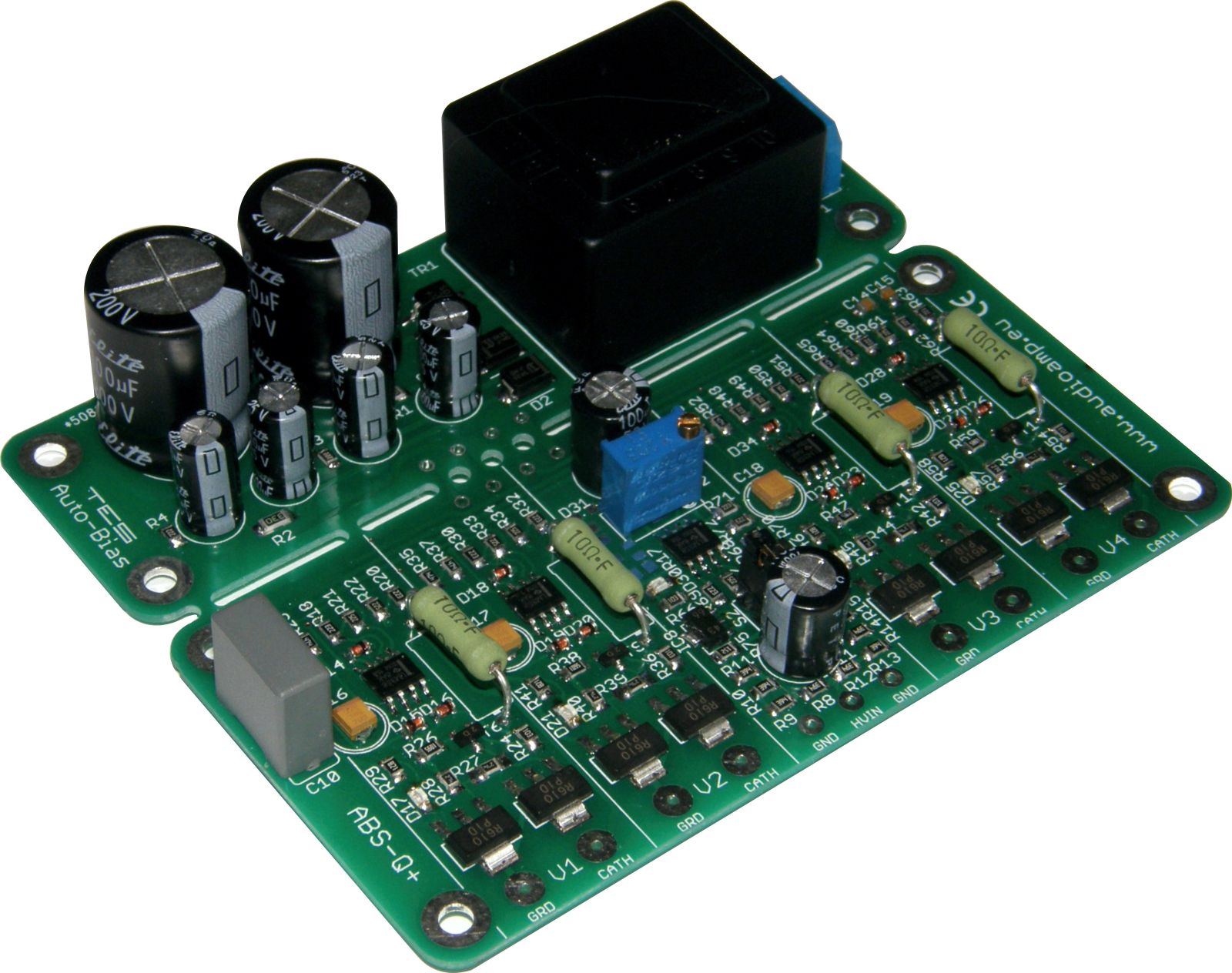
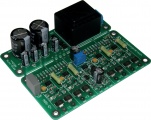
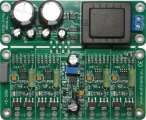
| Manufacturer: | TES |
| Price : | 108,00 € |
| Availability: | In stock |
The model ABS-Q+ auto bias module is designed to optimize the bias for four triode or pentode output tubes in Push-Push (PP) or Parallel-Push-Pull (PPP) amplifiers that not have their own negative bias supply circuit.
Bias supply circuit on ABS-Q+ max -90V.
DC current saturates an output transformer which results in increased low frequency distortions.
The ABS-Q+ will operate with the filament supply in your amp reference to ground, such as a center tap, since it comes with it own power transformer!
- PCB dimensions are 100mm x 80mm x 25mm high / 4" x 3.15" x 1" high
- completely autonomous, comes with its own bias and operating supplies!
Introduction:
This module has been designed to maintain a constant bias voltage through all power output tubes for your tube stereo power amp.
The bias is kept at a constant level on the output tubes, irrespective of the signal level.
Benefits:
The advantage of using the ABS-Q+ module is that it will extend output tube life, in a lot of cases it will also improve the sound and last but not least, you will never have to worry about adjusting the bias again.
- Instead of a pair of output tubes being biased together, now all output tubes are individually biased for greater control and stability
- No need to keep an eye on and/or adjust the bias of the output tubes
- Significant extension of the output tubes life
- Bias is not influenced by the input signal
- Undistorted and improved sound for a great listening experience
- Reduction in hum and noise level of the amp
- No maintenance or additional adjustments are required after the initial setup
- Improved overall operation of the amp due to the reduction in the danger of a tube red plating
- The ABS-Q+ ensures that bias is kept at the pre-set value (see Initial Setup) even as the tubes age
- The ABS-Q+ comes with a soft start feature, which slowly brings up bias to each output tube
- The ABS-Q+ comes with its own 6.3VAC AND bias supply power transformer, so this auto bias module is completely independent!
Quick Overview:
The ABS-Q+ module has four blue LED’s, one for each output tube, which when lit, indicate that bias is at the correct level and that all is good with each tube.
Should any of these blue LED’s go out or not go on after power up, means that here is an issue with that given output tube and that the tube in question needs to be immediately replaced.
When the amp is powered up, at first a red LED will be on, indicating that there is power to the ABF-Q module. The red LED will go out after about 20s.
After a further delay of between 60-80s, each of the blue LED’s should come on indicating that the bias is now set and stable for each output tube. The amp is now ready to use.
The ABF-Q is suitable for class A, AB and C tube amplifies.
Presetting the ABS-Q+ module bias level:
Before the ABS-Q+ module can be wired up, you need to preset its bias voltage.
As an example, for EL34 tubes, we recommend a bias voltage of 425mA, for KT88 tubes we recommend 450mV. You will need to consult the tube specifications in order to determine the optimal bias voltage for the tube in your amp.
This bias level is set using the blue colored trimmer on the ABS-Q+ module.
We strongly recommend that you preset the ABS-Q+ module before you proceed with installing it into your tube amp!
The ABS-Q+ has its own power transformer for the 6.3VAC supply as well as the -ve bias supply, so simply connect a pig tail power cord to the 115V mains terminals.
Place your ABS-Q+ module on a non-conductive surface. Apply power to the ABS-Q+ module and you should see the red LED on the ABS-Q+ module light up. This LED will go out after about 20s.
Set your meter to read DC and to the lowest scale, say 1V, 2V or 5V. Put the black meter lead on any GND pad on the ABS-Q+ module and put the red meter lead on the pad next to electrolytic capacitor, see below. Now adjust the blue trimmer until the desired bias level is achieved.
That’s it, you just set the ABS-Q+ module to the desired bias operating level.
Example:
PP stage 2 x EL34, class AB1, ultra linear:
To set the bias for an EL34 tube, the recommended anode current for AB1 class is 42.5 mA. We therefore set the bias at 425 mV (0.425 V).
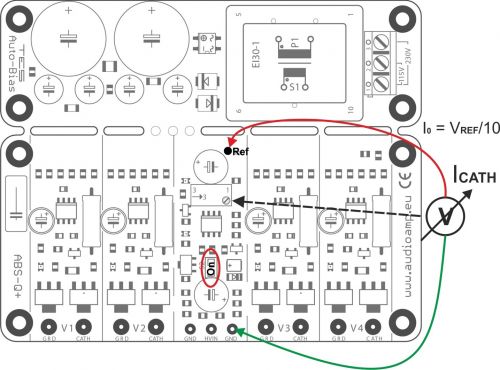
Unplug the power cord, wait for half a minute or so and disconnect the wires from the mains terminals on the ABS-Q+ module.
DO NOT EVER readjust the trimmer once the ABS-Q+ module is installed and wired up. The whole idea is to set in ONCE and forget!
Installing and wiring the ABS-Q+ module into your tube amp:
Please refer to the drawing below, which shows a typical tube amps connection for your ABS-Q+ module.
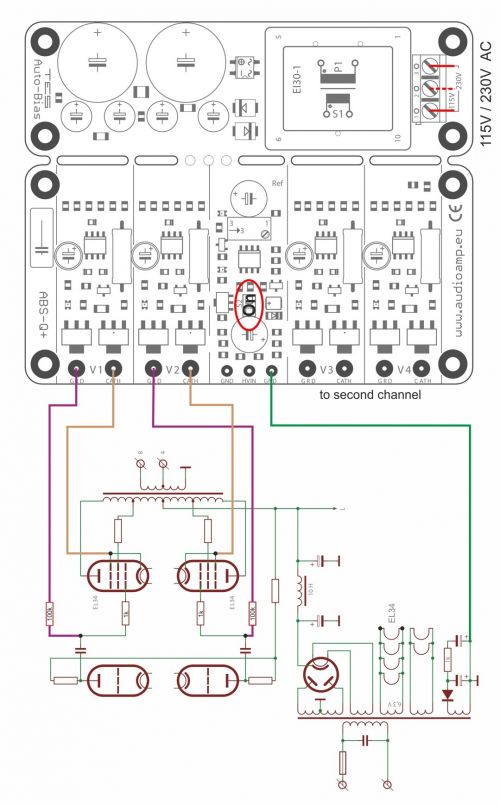
Use this diagram as a reference to the wiring of the ABS-Q+ module into your amp. Only one channel is shown, the other channel is identical.
- Connect a wire from your amps star ground to the GND pad on the ABS-Q+, shown as a green wire in the above drawing
- Connect two wires from your amps power switch or similar for the 115VAC to the ABS-Q+ modules 115V mains terminals
- Connect each of the four CATH pads on the ABS-Q+ module to the CATHODE of each relevant tube, shown as brown wires in the above drawing. With almost most power tubes, this is pin 8. We also recommend that you connect the cathode of your tube, if it is a pentode, to the Suppressor grid, with most power tubes this is pin 1
- You MUST connect an isolation resistor, between 100K and 220K, between each GRD pad on the AB-D module and the OUTPUT end of the output coupling capacitor of your amps circuit, shown as purple wires in the above diagram
- There is a jumper link on the ABS-Q+ module, shown as S2 in the above diagram. If your tube amp DOES NOT have a startup time delay, leave jumper S2 and DO NOT connect B+ to the HIV pad on the ABS-Q+ module, shown as a red wire in the above diagram.
If your tube amp has a startup time delay in excess of the ABS-Q+ soft start time, ie more than 80s, REMOVE jumper S2 and CONNECT speaker B+ to the HIV pad on the ABS-Q+ module!
This now pretty much completes the wiring of the ABS-Q+ module into your tube amp.
Double check all the wiring steps again, even triple check them J
Once you are confident that all your wiring is correct and as per the above steps, it is time to test your ABS-Q+ module installation.
Plug in all tubes, that is the driver tubes, power tubes and the tube rectifier. In order to see the blue LED’s on the ABS-Q+ module, place your amp on its side.
Maybe stick a piece of styrofoam under one of the output transformers to cradle the amp chassis so that the tubes do not touch the bench top.
Connect an 8 or 4 OHM dummy load or your speaker.
Power up your amp. The red LED on the ABS-Q+ module should come on straight away and will go out after about 20s.
After an additional 60 to 80s, each of the blue LED’s on the ABS-Q+ module should start to come on, which indicates that each output tube has reached the preset bias level and all is good. Excellent!
You can measure the actual bias voltage on each output tube with a meter just to double check.
Set your volt meter to the 1V, 2V or 5V scale in DC volts. Put the red meter lead on the cathode pin of the tube socket and place the black meter to the chassis star ground tag. The meter should read close to your preset bias voltage. This reading might be a little higher to start with and will get close to or exactly to the preset bias voltage as the output tubes warm up.
Do this measurement for each output tube.
Leave the amp running for about 10 minutes, all four of the blue LED’s should remain lit.
Power down the amp and let everything cool down a bit. Remove dummy load, if that’s what you used, or disconnect your speaker.
Re assemble your amp and place it in its spot.
Power up your amp and after about 60s or so, the amp is ready!
Table of resistance values of the resistor when replacing the trimmer on the AB module with a fixed resistor:
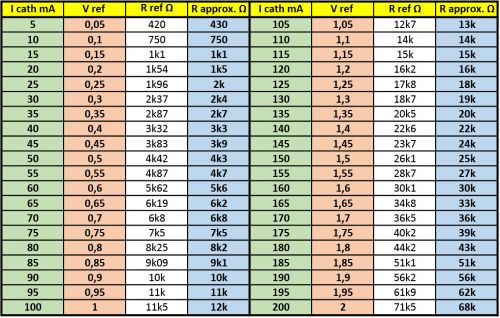
Goods of the same category - Module ABS-Q+ for 4 tubes, PP & PPP amps, with a built in 6.3VAC AND bias supply, 115V or 230VAC powered transformer, fully autonomous. Bias supply circuit max -90V.
Automatic optimize control bias system for triode output stages or pentode push-pull (PP) amplifiers Modules for to optimize bias with an supply for four triode or pentode output stages push-pull (PP) amplifiers Designed for class A, AB, or B ...
Automatic optimize control bias system for triode output stages or pentode push-pull (PP) amplifiers Modules for to optimize bias with an supply for four triode or pentode output stages push-pull (PP) amplifiers Designed for class A, AB, or B ...